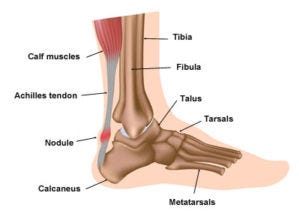Runners with a painful Achilles tendon should stop running ice the painful area use compression socks and elevate the leg for 10-15 minutes 1-2 times per day. Most experts agree that overtraining or incorrect training improper footwear and certain types of terrain lead to most Achilles tendinopathies.
 Achilles Tendon Injuries And Running Read Performance Training
Achilles Tendon Injuries And Running Read Performance Training
Common Causes of Achilles Tendinitis.

Achilles heel pain running. If you neglect the early sign of problems with the Achilles tendon and develop a severe form of Achilles tendinitis you can be crippled temporarily and have your running form altered permanently. Getting to the bottom of your foot pain is sometimes as easy as noticing where you feel the sensation most. People who have fallen arches flat feet or very high arches are more prone to heel pain after running since these foot shapes may put excess strain on the plantar fascia.
So when the Achilles tendon gets injured the runner has a really big problem. Tendonitis is generally an overuse running injury. Achilles tendonitis or achilles tendinitis as it is actually known in the medical world typically starts off as a dull stiffness in the tendon which gradually goes away as the area gets warmed up.
Tight or fatigued calf muscles. Our curated and tested range of running kit covering road trail track field clothing and accessories will get you set with zero compromise on performance or style. The heel counter of the running shoe can also irritate and aggravate the bursa as well as the tendon sheath.
How to Prevent and Treat an Achilles Heel Injury Symptoms of Achilles Tendinitis. Wearing shoes with a slightly higher heel-toe drop can also reduce the stress on the tendon. Heel bursitis symptoms and causes of retrocalcaneal bursitis.
The plantar fascia is. Achilles tendon injury is a common condition that causes pain along the back of the leg near the heel calcaneus bone where it inserts. Heather be addressing how to prevent Achilles te.
Achilles tendonitis is a common problem particularly among running and jumping athletes and if not diagnosed and managed correctly it can become chronic and make even the simplest of daily tasks difficult. Heel retrocalcaneal bursitis Pain tenderness and swelling at the back of the heel can indicate inflammation of the retrocalcaneal bursa. Achilles Tendonitis is a common injury amongst runners and one that requires quite a unique treatment style.
It may get worse with faster running uphill running or when wearing spikes and other low-heeled running shoes. At Achilles Heel were all about the run. Running puts a lot of stress and strain on the body especially on the feet which are a common source of discomfort for runners.
Achilles tendonitis pain often starts as a mild ache either above the heel or in the back of the leg after running. Heel pain after running is often a sign of plantar fasciitis heel spurs or Achilles tendinitis. If your aim is 5K or 262 miles on road or on trail were here to prepare empower and equip you from your first training run through to race-day.
Running Shoes to Help Achilles Pain 10-12mm heel drop Or try adding a heel lift to your existing shoes if you love the fit Stability shoe Cushioned heel collar Brooks Ravena and Asics Gel Nimbus are often recommended. In many cases of achilles tendonitis you will be able to continue running as long as your achilles pain follows a predictable pattern of easing within days of running. Achilles tendonits is most common in runners at the insertion of the Achilles tendon or within 2 to 6 cm of the insertion.
In short you may never run the same way again. This bursa is a small fluid-filled sac that serves as a both a cushion and lubricant between the heel bone and the Achilles tendon. The principle symptoms are pain at the base of the heel especially when accompanied by swelling redness or warmth in the area.
Achilles tendinitis is characterized by dull or sharp pain anywhere along the back of. You might also feel stiffness or tenderness sometimes mimicking as cramp around the affected foot especially in the morning which often fades away with mild activity. If your symptoms begin to worsen over time you must rest from running to allow time for your achilles tendon to heal properly.
Running with bursitis in your heel becomes especially tricky as once your achilles is aggravated it can require months of treatment to calm it back down. It can become irritated and inflamed from excessive walking jumping or running.










